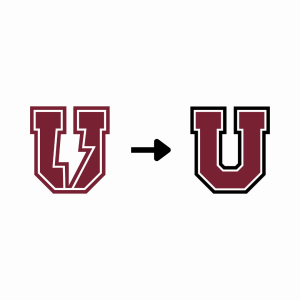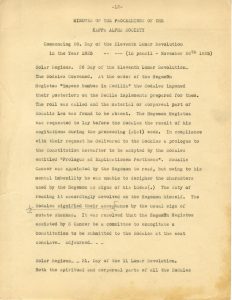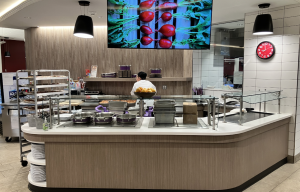Rebecca Shrader on abortion, personal and political
April 28, 2022
On Thursday, April 21, “More than Two Sides: A Conversation on Abortion with Rebecca Shrader,” part of the Constructive Engagement Series’s was held with guest speaker Rebecca Shrader. Shrader spoke about her experience with fertility and abortion, which she has spoken about in her blog, Affections Eclipsed by Glory. The event was held in cooperation with the Williams Legacy Foundation, who sponsored the event.
Shrader, introduced as a “Christian with evolving beliefs” and “passionate about the nuances of abortion, fetal development, and adoption,” recalled her Southern Baptist and pro-life activist background, and her career at a low-risk pregnancy obstetrics clinic followed by work at Duke University. While a volunteer at a pregnancy center that gave free obstetric ultrasounds, Shrader hoped to show fetal development and convince people to choose life.
While working in obstetrics in 2013. Shrader was carrying her first child, and as an obstetric sonographer, scanned herself weekly. In one scan of her fetus, she saw it had limb-body wall complex, a nongenetic condition that affects one of 50,000 births. In this case, the prognosis was extremely bleak. As Shrader was pro-life, she chose to try delivering it. Shrader named the fetus Cora and held a baby shower. On Monday at work after the shower, she scanned the baby and found it without a heartbeat. She buried it with a memorial at a baby cemetery with family. Shrader’s support network from family and church made it so she was “never alone” at the hospital, and supported her throughout.
It was after this that Shrader’s blog gained global attention, and many women with similar experiences reached out. Shrader and her husband also began a process to adopt an Ethiopian child (she would bring Aben home in 2017), and by June 2014 she had her first child, Lydia.
When Lydia was in pre-K, Shrader became pregnant again, scanning weekly and blogging. In the baby’s seventh week, she saw a cranial issue, likely anencephaly, an improper fusion of the top of the skull. Shrader said that no babies with it have lived more than a few weeks, and treatment is impossible. She and her husband named the baby Layla and decided to deliver it for organ donation, which she learned was possible in an anencephaly Facebook group. However, due to premature death, prohibiting donation After this, Shrader was “triggered daily” in her obstetric work, and feared explaining the death to her children.
Shrader shared her thoughts on the scientific and political side of the issue, saying both sides of abortion debates “have extremes [she] “can’t support”. Shrader recalled an anonymous friend from her church, whose baby had trisomy 13, a not uncommon syndrome. To enter a Planned Parenthood, she walked through a “gauntlet” of protesters who shouted “horrible things.” Shader’s friend received insufficient support from her church community, where the pastor was attacked for not disciplining her.
Shrader believes that everyone is entitled to care and compassion for infertility treatment. Speaking about Roe v. Wade, Shader said it “should be the law of the land and that Christians should focus on making abortion unnecessary, not illegal”. Shrader recalled cases in which pharmacies denied miscarriage medications, which are the same two pills as for abortion. If legislation against the pills were to pass, women with life-threatening ectopic pregnancies might continue to be denied treatment. Shrader also detailed cases in which anti-abortion laws effectively force doctors to call lawmakers to ask if certain medical practices are legal, causing unsafe wait times. Citing The Atlantic’s article “A Covert Network of Activists Is Preparing for the End of Roe”, Shrader noted that 13 states have laws to ban abortion once Roe v. Wade falls and that many counties lack abortion access. She also noted Dobbs v. Jackson Women’s Health Organization, to be before the Supreme Court in June, which could ban abortions before 15 weeks, effectively ending Roe v. Wade. She then discussed the return of do-it-yourself abortions, which killed many in the ’70s. The components for “lunch hour” canula abortions, done with a glass jar, tube, and syringe, can be easily ordered online.
Shrader said the overall situation is “hard to watch as someone [who would have] been affected by these laws”, and that with her pro-life experience, she hopes to hear “women caught in the middle” of political divisions. Though she stands choosing to deliver her high-risk pregnancies, Shrader said that if she had a third baby with a known lethal condition, she doesn’t know if she’d do the same. “Everyone should have the freedom I had”, she added, saying she can’t imagine where her friend would be now if denied an abortion.
Union’s President, David Harris, who started the series four years ago, prefaced the talk. Upon hearing Shrader’s This American Life podcast episode, he thought it fit the series’s theme: Harris challenged attendees to “feel how someone could feel differently” on abortion even if they “don’t change your mind”. Harris further said he was “really excited” for “suggestions from students or others in the community to talk in a more open way about ‘X’ as a society.”






